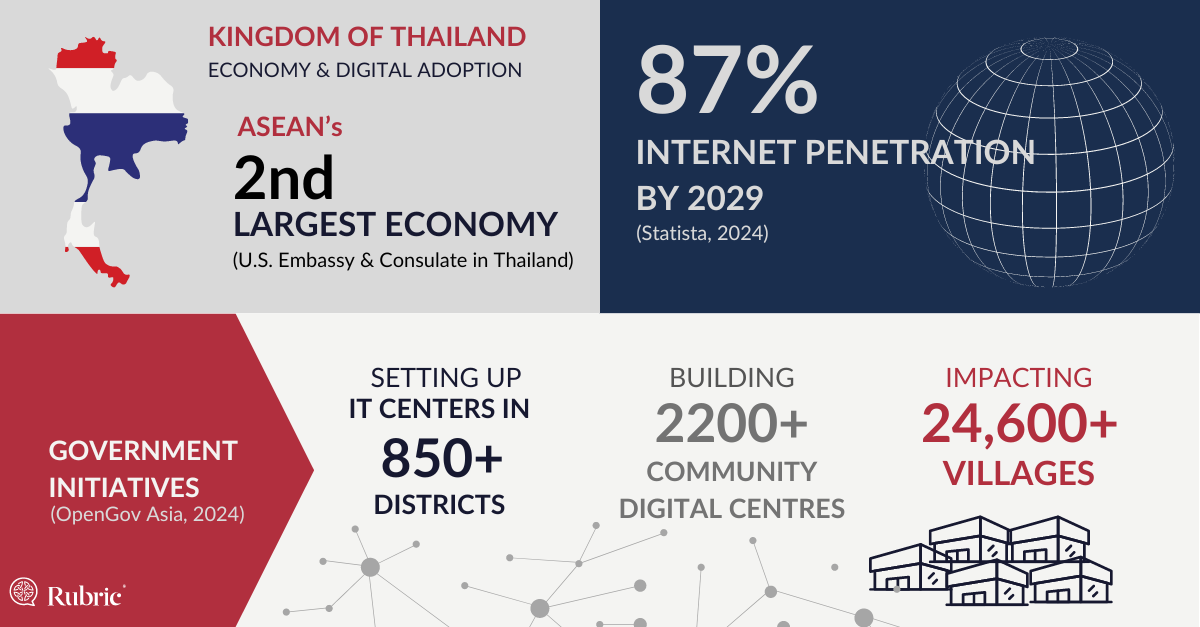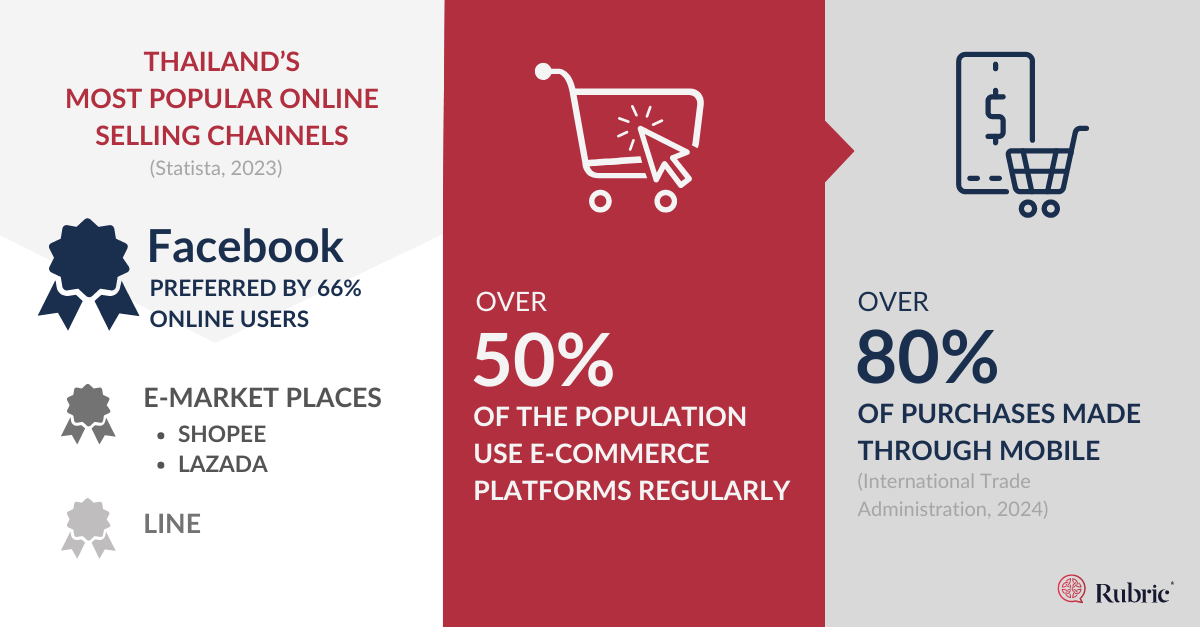
Is the Thailand market right for expanding your global business? The Thai market can bring with it a range of benefits.
As a key player in the Association of Southeast Asian Nations (ASEAN) and well-oriented for a digitally and technologically advanced business environment, Thailand is worth serious consideration for any business wanting to expand into the Southeast Asian market.
Let’s look at some factors that make this country a great market to enter.
Market overview: What you need to know about Thailand
The Kingdom of Thailand lies at the heart of Southeast Asia. It shares its border with Malaysia, Myanmar, Cambodia, and Laos.
The population of Thailand is 71 million and the country is ASEAN’s 2nd largest economy. The region’s top industries include tourism, export, agriculture and electronics.
Its capital city Bangkok is a popular tourist destination and is known for its culture, cuisine, and vibrant nightlife.
Digital adoption in Thailand: GDP and demographics

Thailand’s internet penetration stands at 76.5% and is expected to hit 87% by 2029. The government is setting up IT centers in over 850 districts and over 2200 community digital centers. This is expected to impact the quality of life and connectivity across approximately 24,600 villages.
In the business space, the government is boosting digital infrastructure developments through Digital Park Thailand and Software Park Thailand. While one focuses on facilitating access to submarine cable systems and data centers, the other intends to support software technology, training, and international collaborations.
What languages are spoken in Thailand?
Thai is the national language of Thailand and is spoken by almost the entire population but may vary in its dialects. Standard Thai is spoken in central Thailand while the dialect of the Lao language is spoken by one-fourth of the population.
Other dialects include Northern Thai (Kammüang) and Southern Thai (Pak Tai) spoken in the northern and southern regions respectively. In addition, dialects of Malay and Chinese are also common in the region.
5 compelling benefits to doing business in Thailand
There are several advantages to doing business in Thailand and below are the 5 key ones:
1. Strategic access to Asia
Thailand allows access to the Asian market and shares close trade relations with India and China. As a member of the Association of Southeast Asian Nations (ASEAN) and its trade agreements, it supports trade relations with Singapore, Vietnam, Cambodia, Indonesia, Malaysia, and other ASEAN countries.
2. Strides in AI and LLM
Developing Thailand’s Artificial Intelligence infrastructure is an important project on the government’s list. It is expected to help build Thailand’s AI capabilities and support it with better governance and regulations.
There is also an increased focus on developing Thai Language Learning Models to increase its natural language processing capabilities and support customer service solutions in the future.
3. Access to digitally skilled workforce
The government is working toward developing infrastructure for the future digital workforce. It is focusing on manpower development to build this workforce locally while also attracting global digital talent by issuing Global Digital Talent visas.
Businesses looking for digitally skilled talent stand to benefit from this move.
4. Pro-business environment
The environment is supportive of Foreign Direct Investments (FDI) where companies can apply to achieve up to 100% foreign ownership. Depending on the industry, businesses can also enjoy tax incentives. In Asia, Thailand is one of the few countries with a low corporate tax rate of 20%.
The country has also assigned Special Economic Zones to support businesses and allow access to foreign labor, infrastructure, and one-stop services.
5. Low business costs
Office spaces in Thailand are available at much lower rates than those in other countries in Asia. For example, a space in Bangkok is available at half the price of that in Ho Chi Minh City. It is one-fourth the cost of a space bought in the capital city of India or China.
In addition, businesses benefit from relatively lower labor wages and a low wage inflation rate.
Compliance and regulations in Thailand you should know about
In 2023, Thailand introduced the Royal Decree to regulate digital platforms. This law imposes certain obligations on digital platforms and operators are expected to provide information and meet specific requirements. Therefore, businesses need to be aware of the rules that would apply to them.
US companies and individuals doing business in Thailand would benefit from familiarizing themselves with the US-Thailand Treaty of Amity. In addition to enjoying certain perks, they are exempt from several restrictions that would otherwise apply to foreign investments.
What is the political climate like in Thailand?
Thailand’s political system is a parliamentary democracy with a constitutional Monarchy. The king is the head of state and appoints the prime minister who is the head of government.
The sovereign power has three arms that focus on the executive, legislative, and judicial aspects. The monarch exercises these powers via the Parliament, the Council of Ministers, and the Court.
Overall, the political risk in the country is moderate, and Thailand’s economy has been quite resilient in weathering political cycles.
The 5 keys to successful sales in Thailand
There are a few things to keep in mind while selling your products and services in Thailand. Here are 5 key things to consider:

1. Utilize direct marketing channels
Both traditional and nontraditional direct marketing channels are effective in Thailand. This spans television, radio, and newspapers as well as online ads, and email marketing among others.
Facebook is the most popular online direct marketing channel preferred by almost 66% of internet users. This is followed closely by Shopee, Lazada, and Line.
2. Be aware of the negotiation culture
Business negotiations can be a slow process in Thailand and the expectation is that both parties will make concessions and meet halfway. Bargaining is a part of the negotiation culture so businesses are recommended to make room for haggling and be open to adjusting their expectations.
Companies also need to make sure that deals are being struck with senior personnel as juniors are seldom entrusted with decision-making power.
3. Select a fitting distribution channel
Interpersonal relationships are an important part of the business culture therefore utilizing local agents and distributors can be beneficial when it comes to interacting with customers and other stakeholders. This also helps with overcoming the language barrier.
It is not a legal requirement to have a distributor though. Many foreign businesses operate in Thailand through private limited liability companies.
4. Focus on mobile e-commerce
E-commerce is a well-developed space in Thailand and holds opportunities for future growth. Over 50% of the population uses ecommerce platforms regularly and mobile devices account for over 80% of online purchases.
As a result, there has been an upsurge in the use of mobile wallets. Businesses can adopt device-specific targeting strategies to make use of this change.
5. Focus on ESG requirements
In line with the government’s sustainable development roadmap, businesses are expected to provide reports about their environmental, social, and governance (ESG) performance.
Companies looking to set up operations in Thailand would need to align themselves with the regulatory and review processes that are followed.
Where to get further help on moving into Thailand
Are you interested in entering the Thailand market?
With over 30 years of experience in designing localization strategies for global companies, our team of experts can help you localize your global content into Thai.
Get in touch today to learn how our products and services can help you with this transition.